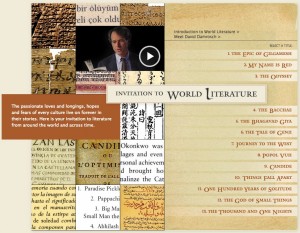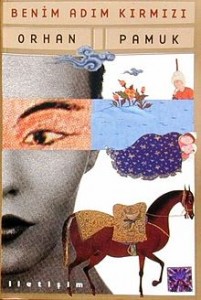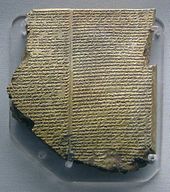I’d heard of the Epic of Gilgamesh, but my knowledge was limited to a vague notion that it contained an account of a flood somewhat similar to that in the Bible. Little did I realise that it contained a whole lot more, deftly revealed in the online course Invitation to World Literature.
I came across the course serendipitously, having decided that I should look a little more closely at a MOOC or two. I haven’t always written positively about them, but the criticism has been aimed more at some of the shysters promoting them and the ludicrous hype that was bantered about a year or so ago. My starting point was Open Culture, which contains links to 1000+ ‘MOOCs from Great Universities (Many with Certificates)‘.
 Invitation to World Literature was produced by the US-based Annenberg Learner, a well-established and highly reputable organisation supported by the Annenberg Foundation. As the Introduction reveals,
Invitation to World Literature was produced by the US-based Annenberg Learner, a well-established and highly reputable organisation supported by the Annenberg Foundation. As the Introduction reveals,
This multimedia series, Invitation to World Literature, offers you a passport to this rich heritage via thirteen works from a range of eras, places, cultures, languages, and traditions. These are books that we hope spark your interest, or satisfy long-standing curiosity about things you wished you had read, or introduce works that are new to you, opening up a world of connections and experiences.
The 13 works are well-chosen, clearly reflecting the aims of the producers. I won’t list them, as if you click on the pic of the interface you’ll get a more easily readable version. I suspect that, like me, you have a passing knowledge of a few titles (The Odyssey, Candide, The Thousand and One Nights), but what do you know about Popol Vuh? Quite a fascinating mixture across the ages, I’m sure you’ll agree. Always tricky to choose something contemporary, of course, but a goodly sample of bibliophiles would at least grudgingly agree with The God of Small Things (Arundhati Roy), I would claim. The other recent title, My Name is Red (Orhan Pamuk), is likely less well known (unless you’re Turkish!), but maybe here I’m just displaying my appalling ignorance of world literature.
The interface is clean and inviting, and the material and background resources well-chosen and lovingly presented. You can delve via the ‘Watch’, ‘Read’ or ‘Explore’ menus, each simple to navigate.
Getting back to The Epic of Gilgamesh, what’s it all about anyway?
Adventure, the quest for immortality, the getting of wisdom, and more than a few life or death battles. Gilgamesh has all of this and more, including reflections on what it means to be alive, in 2800 BCE, no less than in our own time.
That sounds pretty good, and the more you delve into the history of how we came to learn about it and what it contains, the more you have to agree with the above summation. Did you know that not only is it ancient (dates from before 2000 BCE) but also that it was lost for nearly 2000 years (from about 100 CE to the late 1800s)? And even the meaning of the name Gilgamesh is enticing and mysterious: ‘He who saw the deep’.
David Damrosch from Harvard University does a wonderful job tying it all together through his writing and videos (with transcripts, of course), ably aided and abetted by a host of enthusiastic and fascinating collaborators (not just academics!).
So, stop skimming and dive in deep! It doesn’t have to be this one: find an online course (even a MOOC) that captures your imagination and get lost its wonders.
Postscript: 20 new lines of the Epic of Gilgamesh have been discovered. “These lines come from Chapter Five of the epic and cast the main characters in a new light. Gilgamesh and his companion Enkidu are shown to feel guilt over killing Humbaba, the guardian of the cedar forest, who is now seen as less a monster and more a king.”


Many thanks for the praise for the series, David!
http://afewreasonablewords.com/2015/08/25/reasonable-words-banging-my-own-drum-edition/